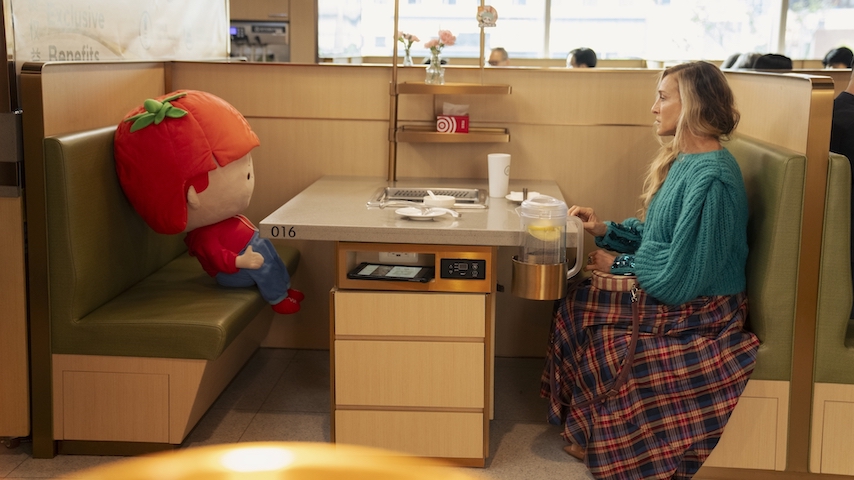How do you solve a problem like Carrie Bradshaw? She is both a romantic and a cynic. A feminist icon and a woman defined by men. A generous friend and a monstrous narcissist. She is a walking contradiction. How do you write an ending for a character like that?
Though viewers look at it now through a two-decade haze of fondness, Sex And The City struggled with the same question. After leaving New York for Paris to be with her questionable artist boyfriend, Carrie (Sarah Jessica Parker) got her happy ending in the form of a grand gesture from and reunion with Mr. Big (Chris Noth). Not only that, but the other three women ended their stories happily domesticated (two married with babies and one coupled up).
To understand what that choice means, you have to understand that SATC wasn’t just a show—it was a cultural blueprint. For many women, especially those navigating their twenties and thirties in urban spaces, it offered a seductive vision of independence, friendship, and sexual agency. Carrie and her friends weren’t just characters; they were avatars of possibility. The show gave us brunch as ritual, Manolos as aspiration, and the idea that your girlfriends could be soulmates. But it also quietly reinforced the notion that all roads—even the glittery, cosmopolitan ones—should eventually lead to romantic partnership. Neatly tied up with fairytale endings that reinforced traditional romantic tropes, if not the patriarchy itself, was the SATC finale a betrayal of the show’s original spiky boldness? It wasn’t just that Carrie ended up with Big. It was that the show seemed to say, “See? All that independence was just a detour.”
But like its protagonist, the series was a contradiction of feminist and fantasy. Given SATC’s depiction of Manhattan as a fantasyland—one that persists for young women even decades later—how else could it end? With Carrie alone? What would it have meant for 38-year-old Carrie to end up alone in the finale of SATC? A subversion of societal norms, a rejection of Big’s behavior as irredeemably toxic, and a recognition of Carrie as a woman who not just didn’t fit into traditional conventions but whose happiness was actually best found outside those conventions. In theory, that’s what And Just Like That… sets out to do, but where it might have been a bold choice 20 years ago, now it’s too little, too late. Michael Patrick King wants to have his cake and eat it too.
The show doesn’t just build up to the “alone” ending—it bludgeons the viewer with it over and over during the two final episodes. Carrie wants to end her novel with the heroine alone in her garden, but her editor asks for a more hopeful epilogue. When Carrie tries to dine solo at a sleek, futuristic restaurant, the host seats a plush tomato doll across from her: “You don’t have to eat alone!” Carrie laments to Charlotte (Kristen Davis) that though she’s been on her own before, “I’ve never lived alone without the thought that I wouldn’t be alone for long…I have to quit thinking maybe a man and start thinking maybe just me. It’s not a tragedy; it’s a fact.”
By depicting all this handwringing over Carrie’s lack of a man, AJLT is hoping to bully its audience into having a more evolved stance on Carrie. If you, too, just want to watch her wind up in the arms of a guy, you’re no better than her silly book editor. It’s as if AJLT doesn’t trust us to accept Carrie alone, so it keeps nudging us, reminding us, and justifying itself. But in doing so, it reveals its own insecurity. A truly confident show would let Carrie be alone without apology. AJLT wants credit for being bold, but it also wants to keep everyone comfortable.
While the show tries to frame Carrie’s solitude as a deliberate and empowering choice, it’s worth noting that this ending may not have been planned as a true series finale. Despite King posting to social media that season three was “a wonderful place to stop,” rumors swirled that it was a cancellation that caught him and Parker off guard. This context complicates the show’s messaging: Is Carrie’s ending a bold feminist statement, or simply the result of an unfinished arc?
Because Carrie Bradshaw alone at 59 is not the same as Carrie Bradshaw alone at 38. At 38, the world tells you there’s still time, and actively rejecting that idea means something. It would have been a statement. But now, Carrie isn’t alone because she chose herself over Big. She’s alone because Big died. She’s on the other side of a successful (romantically and financially) marriage that left her a wealthy widow. The epilogue she eventually writes—“The woman realized she was not alone. She was on her own.”—is girlbossy in tone but emotionally thin. It’s easy to be on your own now! Big’s money has cocooned you in a giant house and a wardrobe that could fund a small country! Didn’t you just have a fling with a world-famous writer? Why are we talking about Carrie being alone as if she’s this dusty spinster that no one will ever look at again?
Of her novel’s ending, Carrie says it feels “honest” for the woman to end up alone. Does this ending, planned or unplanned, feel honest? What would an honest conclusion for 59-year-old Carrie Bradshaw and all her contradictions look like? The truth is that nailing the intersection between fantasy and feminist is hard, but AJLT would have done better to try rather than pretend it’s doing something revolutionary here.

 Keep scrolling for more great stories.
Keep scrolling for more great stories.
